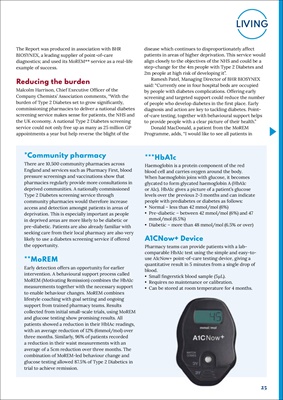
25
LIVING
The Report was produced in association with BHR
BIOSYNEX, a leading supplier of point-of-care
diagnostics; and used its MoREM** service as a real-life
example of success.
Reducing the burden
Malcolm Harrison, Chief Executive Officer of the
Company Chemists' Association comments, "With the
burden of Type 2 Diabetes set to grow significantly,
commissioning pharmacies to deliver a national diabetes
screening service makes sense for patients, the NHS and
the UK economy. A national Type 2 Diabetes screening
service could not only free up as many as 25 million GP
appointments a year but help reverse the blight of the
disease which continues to disproportionately affect
patients in areas of higher deprivation. This service would
align closely to the objectives of the NHS and could be a
step-change for the 4m people with Type 2 Diabetes and
2m people at high risk of developing it".
Ramesh Patel, Managing Director of BHR BIOSYNEX
said: "Currently one in four hospital beds are occupied
by people with diabetes complications. Offering early
screening and targeted support could reduce the number
of people who develop diabetes in the first place. Early
diagnosis and action are key to tackling diabetes. Pointof-care
testing, together with behavioural support helps
to provide people with a clear picture of their health."
Donald MacDonald, a patient from the MoREM
Programme, adds, "I would like to see all patients in
* Community pharmacy
There are 10,500 community pharmacies across
England and services such as Pharmacy First, blood
pressure screenings and vaccinations show that
pharmacies regularly provide more consultations in
deprived communities. A nationally commissioned
Type 2 Diabetes screening service through
community pharmacies would therefore increase
access and detection amongst patients in areas of
deprivation. This is especially important as people
in deprived areas are more likely to be diabetic or
pre-diabetic. Patients are also already familiar with
seeking care from their local pharmacy are also very
likely to use a diabetes screening service if offered
the opportunity.
**MoREM
Early detection offers an opportunity for earlier
intervention. A behavioural support process called
MoREM (Motivating Remission) combines the HbA1c
measurements together with the necessary support
to enable behaviour changes. MoREM combines
lifestyle coaching with goal setting and ongoing
support from trained pharmacy teams. Results
collected from initial small-scale trials, using MoREM
and glucose testing show promising results. All
patients showed a reduction in their Hb1Ac readings,
with an average reduction of 12% (6mmol/mol) over
three months. Similarly, 96% of patients recorded
a reduction in their waist measurements with an
average of a 5cm reduction over three months. The
combination of MoREM-led behaviour change and
glucose testing allowed 87.5% of Type 2 Diabetics in
trial to achieve remission.
***HbA1c
Haemoglobin is a protein component of the red
blood cell and carries oxygen around the body.
When haemoglobin joins with glucose, it becomes
glycated to form glycated haemoglobin A (HbA1c
or A1c). HbA1c gives a picture of a patient's glucose
levels over the previous 2-3 months and can indicate
people with prediabetes or diabetes as follows:
• Normal - less than 42 mmol/mol (6%)
• Pre-diabetic - between 42 mmol/mol (6%) and 47
mmol/mol (6.5%)
• Diabetic - more than 48 mmol/mol (6.5% or over)
A1CNow+ Device
Pharmacy teams can provide patients with a labcomparable
HbA1c test using the simple and easy-touse A1cNow+
point-of-care testing device, giving a
quantitative result in 5 minutes from a single drop of
blood.
• Small fingerstick blood sample (5µL).
• Requires no maintenance or calibration.
• Can be stored at room temperature for 4 months.